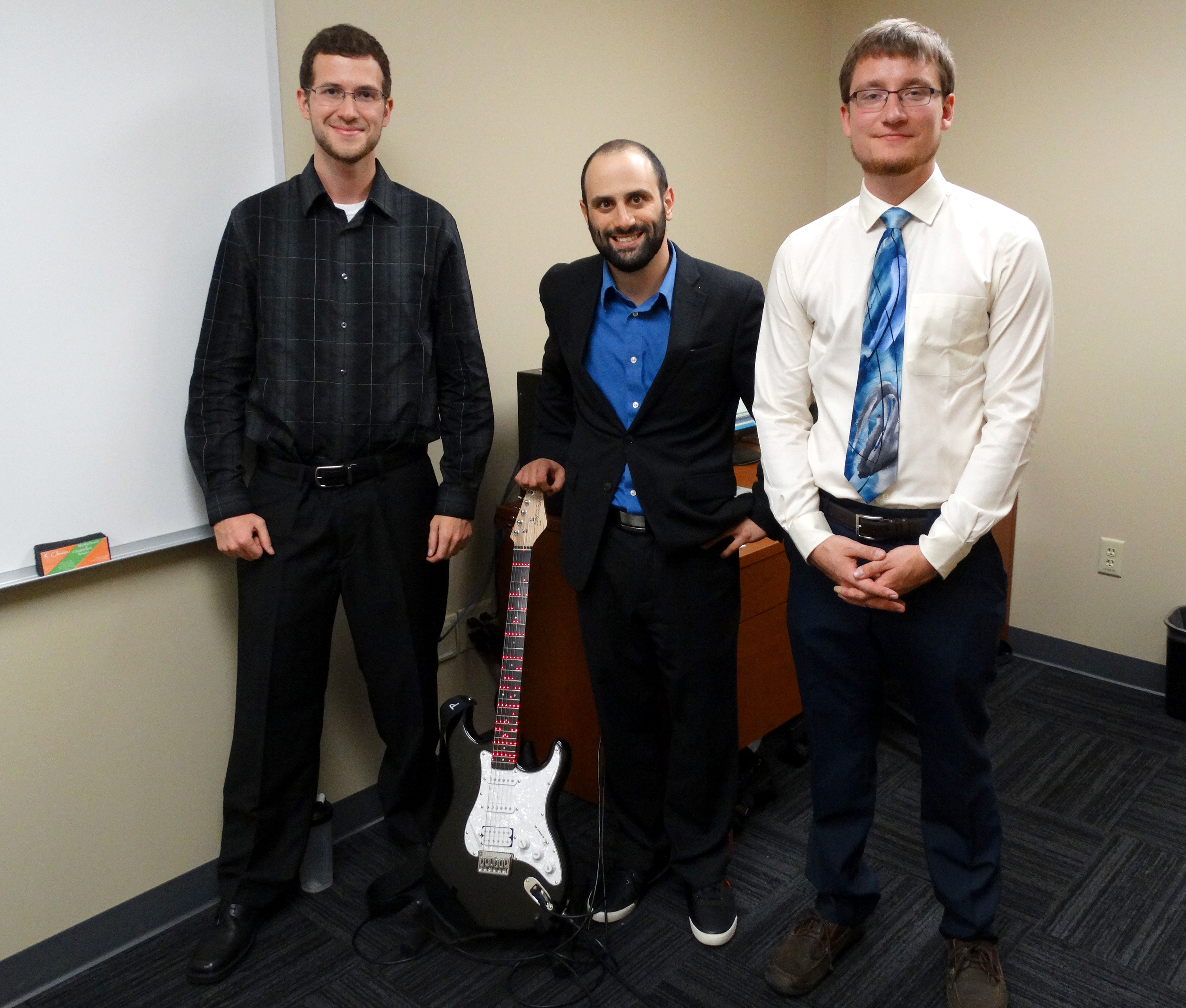When Joseph Keebler, assistant professor of psychology at Wichita State University, contacted Optek Music System CEO Rusty Shaffer in the summer of 2012, neither dreamed it would lead to multiple research contracts and a long-term relationship between the two organizations.
Optek and Wichita State recently finalized a second contract for continued research of Fretlight guitars, including usability and training. Fretlight guitars are equipped with built-in LED lights behind the fret board, lighting fingering positions for chords, scales, songs, riffs and even tablature.
The relationship began when Keebler, who has played guitar for more than 20 years, read about Fretlight guitars in an industry publication and saw an opportunity to conduct human-system integration research with the guitar. He emailed Optek in June of 2012. He had just recently been hired by Wichita State’s department of psychology.
“I knew as a young professor, it would help if I came into the university with an industry research project ready to launch,” said Keebler. “I saw this product was full of potential for training and learning research, and I figured I might as well contact them to let them know I’m interested in working with them towards this purpose. Little did I know it would become a funded project a year later.”
Shaffer vividly remembers the day they were reviewing Keebler’s email.
“It was surprising and rewarding at the same time,” said Shaffer. “We knew because of countless customer testimonials that the Fretlight is a faster, easier and more enjoyable way to learn, but we never had any scientific proof. Having such a credible researcher and university combination interested in studying Fretlight was validating.”
Research options
Initial discussions between Keebler and Shaffer involved identifying research options that would be mutually beneficial to both parties.
“What is great about working with Fretlight is they are entirely open to whatever results I find,” said Keebler. “Most companies only want to find positive results of their product, but Fretlight has given me the liberty to approach my research with a high level of scrutiny.”
The first set of studies, which took a semester to complete, aimed to determine if the use of Fretlight guitars shortened learning time and/or allowed users to retain information learned for a longer amount of time.
For this study, Keebler enlisted the help of a former colleague – Stephen Fiore, associate professor of cognitive sciences at the University of Central Florida – and his graduate research assistant Travis Wiltshire. The study was broken into two separate investigations. Keebler conducted an in-depth study of six participants who were asked to use the guitar in the lab several times in order to determine whether learned skills were retained; while Fiore’s research involved a cross-sectional group of nearly 60 participants who were tested only once to determine how quickly new users could learn a basic guitar scale.
“Our customers have said there’s something special about visual learning versus the back-and-forth process of traditional guitar learning,” said Shaffer. “Dr. Keebler’s research has validated and confirmed these testimonials.”
“Basically, you are removing a large hurdle in the process of learning guitar, namely the ability of reading music/tablature,” said Keebler. “This is something that can take months or years to learn.”
'Valuable on multiple levels'
Results of the studies can’t be released at this time as Keebler’s research is being reviewed for journal publication.
The next round of studies will enlist the help of Wichita State’s Software Usability and Research Lab, led by associate professor of psychology Barbara Chaparro, as well as Fiore’s lab at UCF. Topics of research will include improving the user’s “out-of-the box” experience – how to ease a user into starting from ground zero when a guitar is purchased and arrives at their front door. Keebler will also further investigate methods of improving training to optimize the Fretlight system.
“The research findings are valuable on multiple levels,” said Shaffer. “The entire journey is something that has captivated the company because we’re supportive of the whole concept. We’re all about lowering barriers for people learning to play the guitar – bringing more people to the enjoyment of playing a musical instrument.”
The relationship between Optek and Wichita State has led to additional benefits for Keebler’s Training Research and Applied Cognitive Engineering (TRACE) lab, including a $1000 grant award to Dustin Smith, a psychology graduate teaching assistant, to work on the project.
The TRACE Lab focuses on utilizing cutting edge technology and science for applied training and assessment across military, medical, and civilian domains. Get more information.
About Optek Music Systems Inc.
Based in Reno, Nevada, Optek Music systems is the manufacturer and distributor of the groundbreaking Fretlight Guitar Learning System. Invented in 1987 by Optek founder and CEO Rusty Shaffer, the Fretlight Guitar has changed the way the world learns to play by combining advanced digital and LED technologies within the timeless form and function of classic electric, acoustic and bass guitars. Optek has many U.S. and international patents as well as patents pending for its interactive guitar learning systems and musical instrument manufacturing designs. Fretlight Guitars can be purchased at select retailers or online at www.fretlight.com.


 WSU Foundation
WSU Foundation